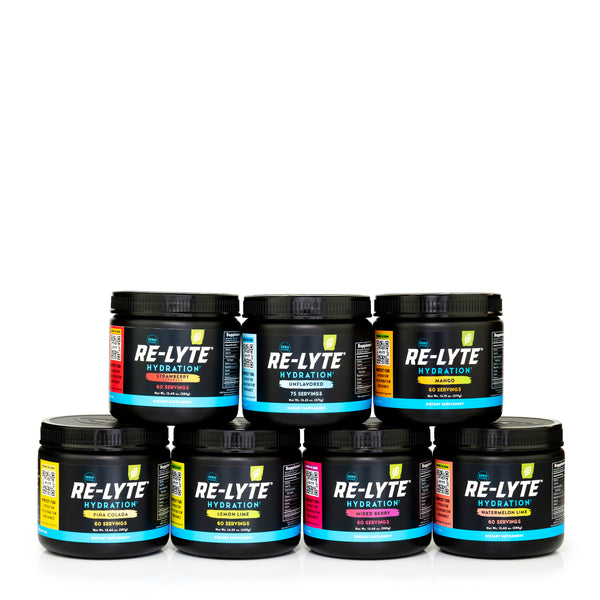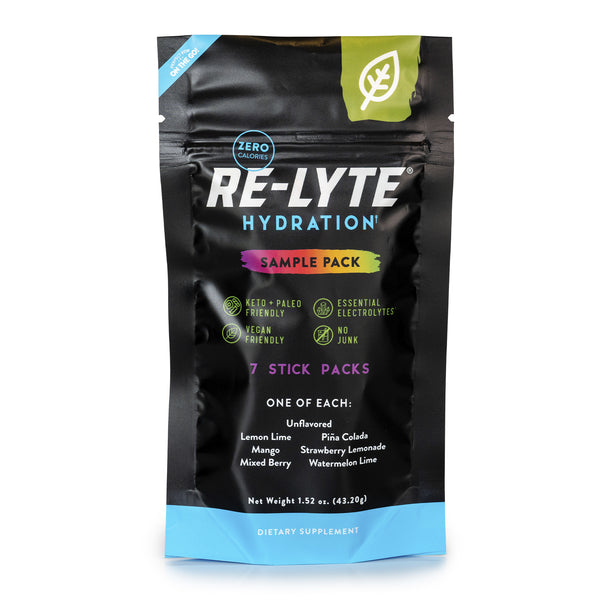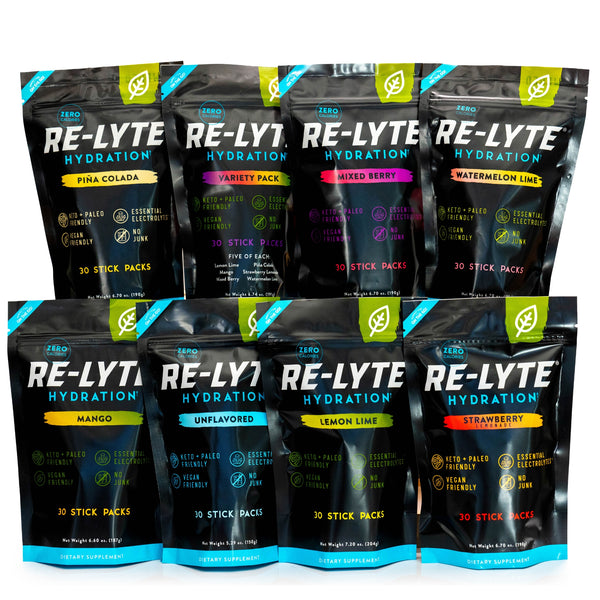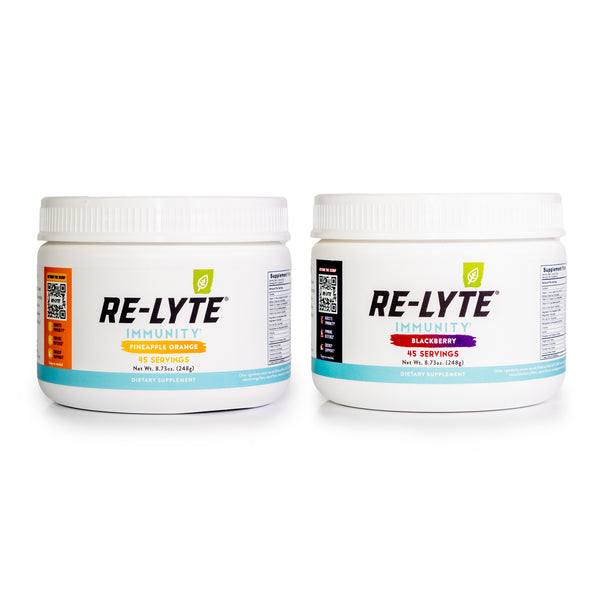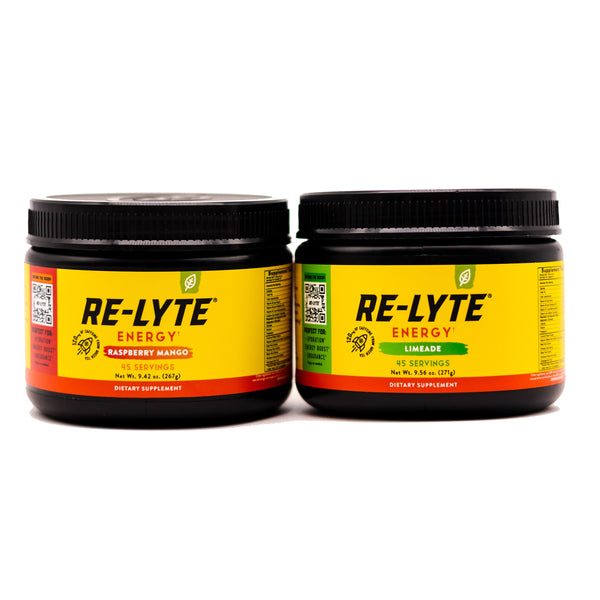Feeling Lousy When You Fast? You’re Probably Dehydrated

Article at a Glance:
- Dehydration causes uncomfortable symptoms during fasts, like fatigue, dizziness, and headaches.
- Drinking extra water during a fast can help but won’t prevent fasting-related dehydration on it’s own.
- You need to replenish electrolytes while fasting to prevent many of the symptoms associated with dehydration.
Fasting makes you feel fantastic. At least that’s what everyone always tells you. Your sister says she has more energy when she’s fasting. Your cardio kickboxing teacher says his mind is clearer. Your best friend says her digestion is better. But when you tried fasting, you didn’t feel so hot.
What gives? Why were you stuck on the struggle bus during your fast while all those other people felt like teenagers again? One word: dehydration
Dehydration is the easiest fasting pitfall to swan dive straight into (heck, it’s even easy to tumble into when you’re not fasting). In fact, if you’re experiencing any uncomfortable symptoms during your fast — fatigue, dizziness, nausea, headaches, constipation— you can bet your favorite yoga pants it’s because you’re dehydrated.
Now, you may be thinking: There’s no way I was dehydrated during my fast. I drank so much water, I practically grew fins.
Drinking lots of water while you’re fasting is good. But it won’t necessarily protect you from dehydration on its own. Let me explain...
While you’re fasting, you need to drink more water than you normally do for two primary reasons: You’re not getting hydration from food (roughly 20 to 30 percent of your daily hydration comes from the food you eat) and you’re losing glycogen. What the heck is glycogen?
Glycogen is what your carbs turn into after they go down the hatch and get processed by your body. Put simply, it’s a stored form of glucose. When you stop eating carbs, your glycogen levels drop quickly. And since each gram of glycogen is bound to about three or four grams of water, your hydration levels drop quickly too.
That’s why some fasting experts recommend doubling your water intake during a fast. But even if you follow that simple piece of advice you could still end up dehydrated if you’re not replenishing your electrolytes too.
You see, in order to achieve hydration harmony, the electrolytes and water in your body need to stay in perfect balance. Typically, you get your electrolytes from food, so not eating causes your electrolyte levels to take a nosedive. On top of that, drinking extra water during a fast dilutes your remaining electrolytes, which leaves your electrolyte reserves really, really low.
Take the electrolytes potassium and sodium, as an example. Research shows these two electrolytes get depleted rapidly in the early part of a fast, and low levels can quickly contribute to headaches and muscle cramps. Not exactly the ideal way to start your fast, am I right? But, the good news is, giving your body a little extra electrolyte love when you fast could help you feel waaaay better.
Want all the best tips and tricks for feeling fantastic while you fast?
JOIN OUR FASTING GROUP ON FACEBOOK
The Simple Way to Feel Better on Your Next Fast
Since electrolytes could be the answer to most (if not all) of your fasting woes, next time you fast, you’ll want to load up on water and electrolytes before, during, and after your fast. But the big question most new fasters have is: How do you get enough electrolytes during a fast when you can’t snack on a banana, bowl of yogurt, or other electrolyte-rich food?
Depending on how strict you’re being on your fast, there are a few beverages you can turn to (like bone broth, coconut water, and even pickle juice) as long as you keep your calorie consumption under 50 calories. If you consume more than 50 calories, your body will leave ketosis (a state where it burns fat for fuel instead of sugar). Ketosis is the reason fasting has so many benefits, so you want to camp out in ketosis for your whole fast, ideally.
Using an electrolyte mix is another potential way to make sure you’re getting enough electrolytes during a fast. Unfortunately, many of these mixes contain a ton of sugar and/or artificial ingredients that don’t exactly complement the clean and healthy fasting lifestyle you’re aiming for. That’s why we made our own— Re-Lyte.
Re-Lyte is a clean, zero-calorie electrolyte mix you can add to your water, coffee, tea, or other fasting-friendly beverages. It contains a research-backed ratio of electrolytes, plus it contains more (and better quality!) sodium than the average electrolyte product.
Re-Lyte is made with unrefined Real Salt that doesn’t contain additives and does contain healthy trace minerals (unlike the processed table salt you’ll find in other mixes). Re-Lyte isn’t sweet either. That’s good news for fasters since a sweet taste on your tongue (even if it comes from a zero-calorie sweetener) can trick your body into increasing blood sugar.
If you take a strict approach to fasting and want to keep your calorie intake at zero, you’ll love Re-Lyte Hydration. If you’re okay with a super salty flavor and prefer to add your own flavors and/or sweeteners, we recommend Unflavored Hydration. Otherwise, try one of our delicious flavored varieties.
Want to tackle your next fast with Re-Lyte by your side?
Sources:
- Fasting: A review with emphasis on the electrolytes— The American Journal of Medicine.
- Contribution of Water from Food and Fluids to Total Water Intake: Analysis of a French and UK Population Surveys— Nutrients.
- Glycogen storage: illusions of easy weight loss, excessive weight regain, and distortions in estimates of body composition— The American Journal of Clinical Nutrition.
- Glycogen metabolism in humans— BBA Clinical.
- Why Water Is So Important When Fasting— Dummies.com.




